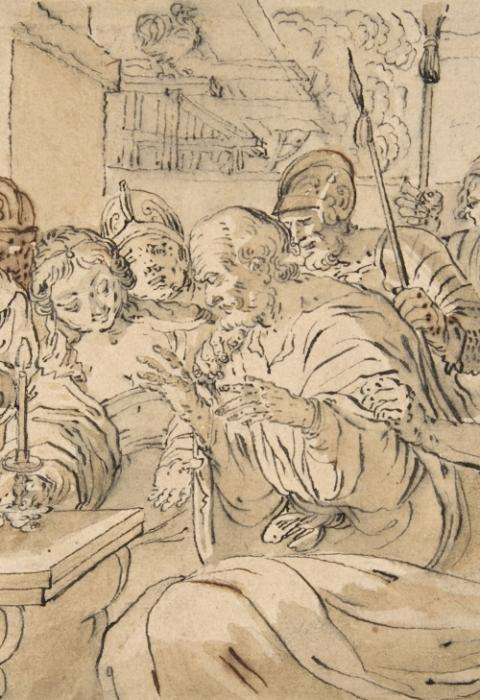
(Unsplash/Nathan Lemon)
"Social justice is a Christian tradition — not a liberal agenda." I believe that is an accurate statement as well as the title to a very good article written by Stephen Mattson.
By following Jesus, which I believe means we have to actively incorporate the beatitudes and works of mercy into our lives, we are engaged in building up the kingdom of God. If God is just and a kingdom is a society, we are necessarily engaged in social justice. After all, in the rite of infant baptism, our parents assented to raising us to keep Christ's command to love God and neighbor; loving one's neighbor seems like a good definition of social justice.
Recently, a confluence of professional and personal stressors laid bare the need for me to do an extensive examination of conscience. I have been soberly asking myself questions, taking stock in what is authentic about me, and plumbing the depth of my strengths, weaknesses, desires and fears. I have been greatly helped by finding and utilizing the "practice space," of Benedictine Br. David Steindl-Rast's Network for Grateful Living.
In this recent examination of conscience, which also includes spiritual reading and daily prayers, an image comes to mind, as does a person.
First, the image is of the caterpillar compiled from a passage of Lewis Carroll's Alice's Adventures in Wonderland. Specifically, the image of the caterpillar asking Alice the question I have been asking myself: "Who are you?" Pope Francis answers this question by saying he's a sinner. Since I dare not plagiarize the pope, though I, too, am I sinner, I need to come up with a different answer.

"The Denial of St. Peter" (1620-38, detail) by Swiss artist Rudolf Meyer (Metropolitan Museum of Art)
Second, the person who comes to mind is that "impulsive master of misunderstanding," St. Peter.
When I read of Peter, I see many of my own personality traits and characteristics. In various passages, he was described very differently. In one passage he's a "rock" (Matthew 16:18); in another, he's one of little faith (Matthew 14:31). He was a follower (of Christ) and he was a leader (of the church); he was a selfless defender of truth as well as self-serving denier of truth. He was always too quick, except for when he was slower than Mary Magdalene and John at the empty tomb. I have no idea how his wife would describe him, but I suspect his mother-in-law was grateful that he asked Jesus to heal her.
When Peter prayed, I wonder how he accounted to God, how he would answer the question, "Who are you?"
I resonate with Peter. I, too, want to seek justice and follow the truth, which takes one to the heart of helping those who have been discarded. I want to serve with compassion as Jesus taught in the beatitudes and works of mercy, with his focus on the widow and orphan, the other (Samaritan), the leper, any person not part of the in-group. And, like Peter, I fail at fidelity to this mission in various ways every day.
Still, the daily invitation to Gospel holiness is an invitation to social justice. For if we choose to follow Christ, and follow him well, won't our actions necessarily be for good, for justice, for the building of the kingdom?
There are some whose ministry or work is on behalf of specific causes identified as social justice issues and they can be an advocate, a balm, to those they serve.
There are also those who are as vicious as Peter cutting off someone's ear in defense of the truth (John 18:10). Though today, the cutting tends to be from trolling words from keyboards more than swords. The pejorative term "social justice warrior" comes to mind. At times, labeling someone a social justice warrior is a cheap and mean way to delegitimize their good work. At other times, it does seem like an apt descriptor.
Advertisement
A few years ago, I attended a symposium on human trafficking put on by a women's religious congregation. Of all 60 people in the room, including the panelists and a survivor, I was the only male present. One young panelist explained that all the evils of the world, including human trafficking, was the result of men still being allowed to freely roam the earth. She shared that her favorite congregation was the Servants of the Immaculate Heart of Mary sisters, not for their charism but because she liked to think that IHM stood for "I hate men."
I empathize with the reality that we live in a society that operates on unjust systems, a throwaway culture where if you're not part of the in-group — be it class, race or gender — your opportunities are fewer, your life is harder, and you'll want to change that oppressive and unjust system. There are many ways to achieve change, but in following Christ, we greatly reduce our options to those that are nonviolent and predicated on the recognition of the dignity of all persons.
I understand that we can be social justice warriors for any topic. If it's a religious warrior, we believe God is on our side, if it's secular, we believe history is on our side. In both cases, humility is replaced with hubris.
I was frustrated that this person believed she was going to achieve justice while clearly having disdain for half of the people on earth. As Dorothy Day is quoted as saying, "I only love God as much as much as the person I love least." What's interesting is that many of us, depending on the topic or our mood, seem quite capable of moving from advocate to warrior with ease and alacrity.
What separates the social justice advocate, you or me when we are positively attending to our work in the vineyard, from the times we are social justice warriors is the belief that injustice and sin — personal and systemic — is undone by love. Love, compassion and forgiveness. The justice wrought, the raising up of the oppressed, the parcel of the kingdom built up by the likes of Day, Jean Vanier, Mother Jones, Jesuit Fr. Greg Boyle and St. Peter were predicated on love for God and neighbor.
For all of Peter's faults and failings, his denials, his dumb comments, comments so egregious that God himself referred to him as Satan, he was able to witness and prove that love can undo what sin and stupidity create. I am grateful for that. I am then reminded of the rite of baptism where the priest asked our parents if they understood their responsibility to raise us as Christ taught by loving God and neighbor. Whether in the name of Jesus or social justice, we do a disservice to our baptismal call when we choose not to love in our thoughts, our words and our building of the kingdom.
In my examination of conscience, in my discerning who I am — who God calls me to be — I have found a model in Peter and an image that reminds me of the importance to ask, "Who am I?", so I can be an advocate, not a warrior. I am committed to social justice, committed to building the kingdom. If I do not see love as I look externally, I must look internally and provide the love that is needed to undo wrongs, solve problems, assuage suffering, redeem guilt and love my neighbors.
Amo ergo sum. I love therefore I am. I know it is incomplete but, in my discernment of who I am, that's my definition and my goal.
[Mark Piper, a Packers fan in an unholy land, works in the nonprofit sector and resides in Chicago with his family. He is an alumnus of Amate House, an AmeriCorps-approved year of service organization sponsored by the Chicago Archdiocese.]
Editor's note: We can send you a newsletter every time a Young Voices column is posted to NCRonline.org. Go to this page and follow directions: Newsletter sign-up.








